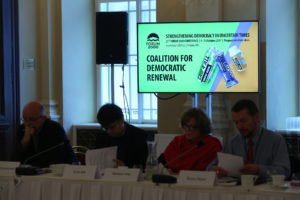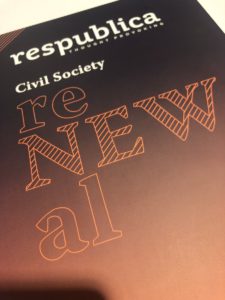
21st Forum 2000 Conference
Revitalizing political parties would serve to both improve democratic accountability and democratic resilience, argues Wilson Center scholar Patrick Liddiard. Parties themselves have the biggest opportunity to halt their own decline by more directly engaging members in substantive internal deliberation, he writes:
States can play a role in increasing the supply of political parties through subsidies that bolster parties’ partner organizations and in boosting the demand for political parties by making voting compulsory (with appropriate accommodations for voters). Given present trends, the alternative is a world with a more anti-government protests over a lack of responsiveness, as in France, or over a lack of democracy, as in Sudan—a world in which a growing number of countries is subject to increasing unrest and the rapid rise and fall of personalist parties, with continuing dissatisfaction with democracy, greater risk of democratic breakdown, and continual policy instability in between.
 In a world of declining political party influence, protest movements and organized labor have increasingly served as vehicles to express grievances and channel political action. However, the limits of protest movements and labor unions’ activities—and their frequent turns to electoral politics—point to the essential role that political parties play in holding governments to account, Liddiard adds. RTWT
In a world of declining political party influence, protest movements and organized labor have increasingly served as vehicles to express grievances and channel political action. However, the limits of protest movements and labor unions’ activities—and their frequent turns to electoral politics—point to the essential role that political parties play in holding governments to account, Liddiard adds. RTWT
Political party reform and development are key issues for democracy assistance groups like the National Democratic Institute and International Republican Institute – core partners of the National Endowment for Democracy – while the NED-affiliated Solidarity Center engages organized labor worldwide on pro-democracy initiatives.







